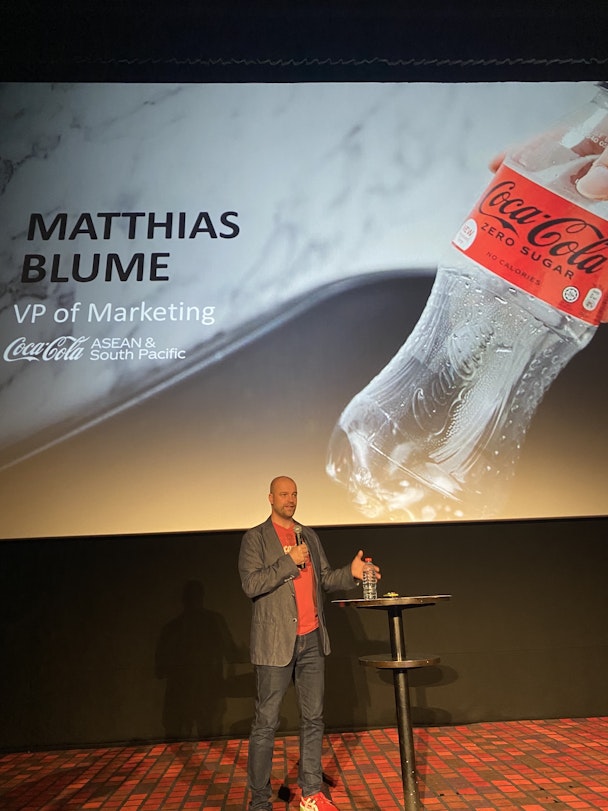Sustainability as important as first-party data, says Coca-Cola ASEAN marketing boss
Marketers should consider sustainability as important as collecting first-party data, according to Coca-Cola’s lead APAC marketer.

Matthias Blume, VP marketing, ASEAN & South Pacific, Coca-Cola delivers keynote at The Drum APAC Trends Briefing event
Matthias Blume, the vice president of marketing for ASEAN and South Pacific, told The Drum’s APAC Trends Briefing event, that marketers have a responsibility to drive education and action on sustainability in order to remain relevant to consumers.
“Generation Z cares more about the environment than any other generation before them,” says Blume. “There is no other mega-trend out there, that is more critical for us and that will drive each and everything that we do. If we, as marketers, don't embrace it. I don't think we have a choice, or a role to play going forward.”
Delivering the keynote presentation at The Drum's inaugural marketing trends event in Singapore, Blume argued that marketers need to own sustainability, taking it out of public affairs, corporate responsibility or even public relations, and embed it firmly within marketing departments in order to drive change.
“Talking about sustainability is fundamental when we talk about consumer centricity," says Blume.
Advertisement
"This is not about sustainability, because somebody in a corporate headquarters decided this looks good in an annual report. This is fundamentally what the consumers expect us to do. And the reason why they're not willing to pay more is because they expect us to do the right things," says Blume.
"We need to rethink our approach and use our power - the force that we have as marketers - to do a better job. Because it's what consumers, employees, and the society around us, expect."
"If you're brand marketer think where's the role in your activity. And it might be just in the way you activate an experience. It might be all the way up to really educating and driving consumer communication."
Advertisement
He believes that sustainability should be treated in a similar way to other marketing priorities such as collecting first-party data and brands should dedicate investment and time to the issue.
"Just like how my question to my team at the moment is, 'how is this activity helping us to collect first-party data?' What if a question were, 'what's the sustainability element in the activation?' 'How do you make sure you're leaving a footprint that is smaller than what it would have been the day before?'
"The number of experiments I'm doing with my team, to see how we stay on top of the different marketing trends is enormous. We have now started to dedicate some of those to sustainability, to understand how we can do things differently. I don't have the answer, we're all learning. If we all put the consumer at the centre, I think we can evolve to a point where we can save solve the issue together."
Suggested newsletters for you
As the backlash to greenwashing in marketing grows stronger, Blume argues that it is not an issue for Coca-Cola which is focused on genuine programs and initiatives to reduce its environmental footprint.
"At Coca Cola, sustainability is reflected today in our company purpose, and part of our commitment is to make a difference in the society we operate, leaving the planet in a better place is fundamental to the way we want to operate. So, we continue to use this purpose as our North Star to see what we want to do and how we operate.”
"At the end of the day, if you do things just to look good, I think it's the wrong thing to do. I want to do things that have the ability to make an impact, they might start small as an experiment for us to learn what makes the biggest difference, and then they grow into something bigger."
Blume accepts that the Coca-Cola brand is front and centre when consumers think about environmental concerns - especially in APAC, which is responsible for 80% of the world's ocean plastic.
"When you see trash somewhere, I guarantee there will one or the other package from our company", he says. However, this is why he believes the company's commitment to solving the problems is so critical.
"It's not something that we want to see as the Coca-Cola company. None of us working at the company wants to see our bottles out there as trash. Because every time I see it, it kind of it hurts, because that's not where we want the products to be."
"Our objective by 2030, is that for every bottle or can that we sell, we collect at least one. It doesn't have to be ours, because we don't think it's an issue of us versus someone else because we believe it is a collective responsibility."
Blume spoke about Sprite and the decision to drop the brand's iconic green bottle and replace it with a clear plastic bottle, which would improve the quality of the recycled material. Blume said the decision to remove the 60-year-old brand's distinctive brand asset and use a clear plastic that meant the drink could be easily mistaken for water was "a very difficult decision"
"I took the risk to say I'm going to drop a distinctive brand asset, in order to do the right thing and start leading from a brand perspective. We spoke to consumers and they realized why we're doing it and they actually appreciated it, they're really happy and excited about it. So it's only a risk if you don't explain it to consumers. But if you explain it creates a big opportunity that you can leverage.
"Design matters in marketing, and it matters a great deal when we talk about sustainability and sustainable packaging."
Blume's keynote highlighted the projects, initiatives and partnerships the brand has established and co-created to help drive greater sustainability initiatives across its own organisation, the industry and the local areas and regions in which it operates.
"At Coca-Cola, we don't have the answer. We're doing a lot of different things to try to find the answer. We don't think there's one solution. But what we're doing is we're making sure that we are part of it," says Blume.

